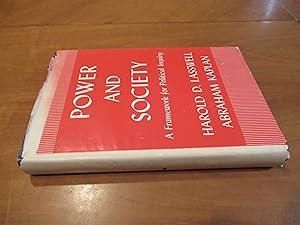Descripción
Xxiv, 295 Pp. Blue Cloth, Gilt. First Printing, With 1950 Date On Title Page, Dust Jacket Priced $4.00. Book Near Fine, No Marks. Dust Jacket With Small Losses At Corners And Top Of Spine, And Spine Panel Completely Faded. Harold Dwight Lasswell (1902 ? 1978) Was A Leading American Political Scientist And Communications Theorist. Lasswell Studied At The University Of Chicago In The 1920S, And Was Highly Influenced By The Pragmatism Taught There, Especially As Propounded By John Dewey And George Herbert Mead. However, More Influential On Him Was Freudian Philosophy, Which Informed Much Of His Analysis Of Propaganda And Communication In General. He Later Taught Political Science At The University Of Chicago (1922?38), Then Served At The Washington School Of Psychiatry (1938?39) And During World War Ii, Lasswell Held The Position Of Chief Of The Experimental Division For The Study Of War Time Communications At The Library Of Congress. He Analyzed Nazi Propaganda Films To Identify Mechanisms Of Persuasion Used To Secure The Acquiescence And Support Of The German Populace For Hitler And His Wartime Atrocities. After World War Ii, He Went To Yale University, Becoming Professor Of Law, Professor Of Political Science, And Ford Foundation Professor Of Law And Social Sciences And Emeritus Fellow Of Bramford College. He Was Also A Professor Of Law At John Jay College Of The City University Of New York And At Temple University. He Was A Visiting Lecturer At Campuses Throughout The World And Was A Consultant To Numerous U.S. Government Agencies. He Served As President Of The American Political Science Association (Apsa), Of The American Society Of International Law And Of The World Academy Of Art And Science (Waas). He Authored More Than 30 Books And 250 Scholarly Articles On Diverse Subjects, Including International Relations, Psychoanalysis, And Legal Education. It Was Later Said "Few Would Question That He Was The Most Original And Productive Political Scientist Of His Time." He Has Been Described As A "One-Man University" Whose "Competence In, And Contributions To, Anthropology, Communications, Economics, Law, Philosophy, Psychology, Psychiatry And Sociology Are Enough To Make Him A Political Scientist In The Model Of Classical Greece.? Lasswell's Work Was Important In The Post-World War Ii Development Of Behavioralism. Similarly, His Definition Of Propaganda Was Also Viewed As An Important Development To Understanding The Goal Of Propaganda. Lasswell's Studies On Propaganda Produced Breakthroughs On The Subject Which Broadened Current Views On The Means And Stated Objectives That Could Be Achieved Through Propaganda To Include Not Only The Change Of Opinions But Also Change In Actions. Lasswell Made These Contributions To The Field Of Communication Study: His Five-Questions Model Of Communication Led To The Emphasis In Communication Study On Determining Effects. He Pioneered In Content Analysis Methods, Virtually Inventing The Methodology Of Qualitative And Quantitative Measurement Of Communication Messages (Propaganda Messages And Newspaper Editorials, For Example). His Study Of Political And Wartime Propaganda Represented An Important Early Type Of Communication Study. He Introduced Freudian Psychoanalytic Theory To The Social Sciences In America. Lasswell Integrated Freudian Theory With Political Analysis, As In His Psychoanalytic Study Of Political Leaders. He Applied Freud's Id-Ego-Superego Via Content Analysis To Political Science Problems. In Essence, He Utilized Intra-Individual Freudian Theory At The Societal Level. He Helped Create The Policy Sciences, An Interdisciplinary Movement To Integrate Social Science Knowledge With Public Action. The Social Sciences, However, Generally Resisted This Attempt At Integration And Application To Public Policy Problems.
N° de ref. del artículo 056316
Contactar al vendedor
Denunciar este artículo
